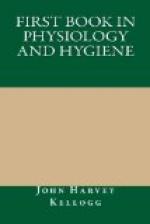9. In the circulation of the lungs, the blood in the arteries is blue, that in the veins, red.
10. The change from blue to red takes place while the blood is passing through the capillaries of the lungs. The change is due to the oxygen which the corpuscles of the blood take up in the lungs.
11. The pulse is caused by the beating of the heart.
12. The heart does a great deal of work every day in forcing the blood into different parts of the body.
13. Some of the white blood corpuscles escape from the blood-vessels through the thin walls of the capillaries.
14. These corpuscles return to the heart through small vessels called lymph channels or lymphatics.
15. The lymphatics in many parts of the body run into small roundish bodies called lymphatic glands.
16. The object of the lymphatics is to remove from the tissues and return to the general circulation the lymph and white blood corpuscles which escape through the walls of the capillaries.
CHAPTER XII.
HOW TO KEEP THE HEART AND THE BLOOD HEALTHY.
1. The heart is one of the most important of all the organs of the body. If we take good care of it, it will do good service for us during a long life. Let us notice some ways in which the heart is likely to be injured.
2. Violent Exercise.—Did you ever run so hard that you were out of breath? Do you know why you had to breathe so fast? It was because the violent exercise made your heart beat so rapidly that the blood could not get out of the lungs as fast as the heart forced it in. The lungs became so filled with blood that they could not do their work well. Sometimes, when a person runs very fast or takes any kind of violent exercise, the lungs become so filled with blood that a blood-vessel is broken. The person may then bleed to death. It is very unwise to overtax the heart in any way, for it may be strained or otherwise injured, so that it can never again do its work properly.
3. Effects of Bad Air.—Bad air is very harmful to the heart and to the blood also. We should always remember that the blood of the body while passing through the lungs is exposed to the air which we breathe. If the air is impure, the blood will be poisoned. In churches and in other places where the air becomes foul, people often faint from the effects of the impure air upon the heart. It is important that the air of the rooms in which we live and sleep should be kept very pure by good ventilation.
4. Effects of Bad Food.—The blood is made from what we eat, and if we eat impure and unwholesome food, the blood becomes impure. We ought to avoid the use of rich or highly-seasoned foods, candies, and all foods which are not nutritious. They not only injure the blood by making it impure, but they cause poor digestion.




